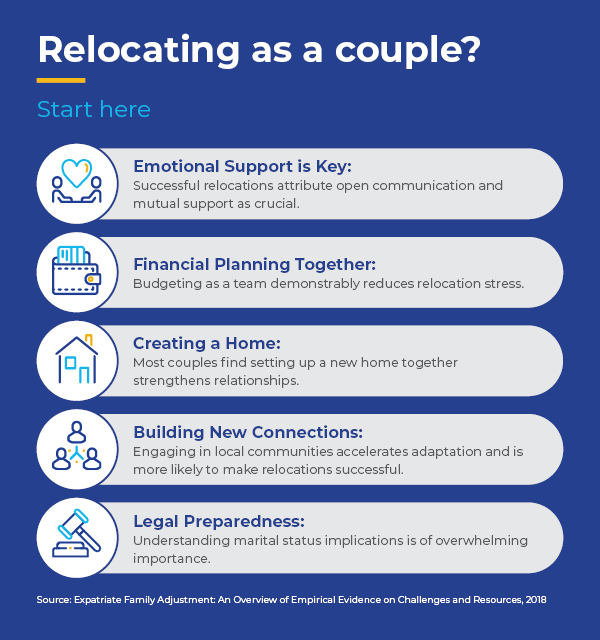Relocation planning for couples
Relocating together overseas is a significant milestone. Not simply a change of scenery, but (hopefully!) a shared journey. This straightforward, six-part guide is crafted for all couples facing the prospect of a relocation.
Our goal is to provide you with essential insights and practical advice to make your transition smoother and more enjoyable. From navigating logistical challenges to adapting to cultural differences, we understand that moving as a couple has its unique dynamics. Our goal is to be with you and your partner all the way, even if all you need for now is some guidance.
You can also take a look at our Relocating with Confidence Guide. It is written in partnership with a professional psychologist as well as a serial expat and aims to prepare individuals, couples, and families for dealing with the stresses of an overseas move.

1. Understanding the emotional journey
Challenges
Despite the excitement, relocating can also be emotionally taxing. It’s normal to face feelings of stress, anxiety, and uncertainty. Your wife, husband or partner, when moving internationally, may adapt more quickly than the other, or you may find yourselves missing the comfort of familiar surroundings and support networks. These emotional challenges are a natural part of the transition and acknowledging them is the first step in managing them effectively. Indeed, a paper published in the International Journal for Human Resource Management found that the mismatch in adapting during this “adjustment period” was one of the reasons a relocation for work purposes may fail.
Support Systems
The key to a successful transition lies in open communication and mutual support. It’s important to talk about your fears, expectations, and feelings throughout the moving process. Be each other’s confidante and cheerleader. As a relocation company with over half a century of experience, we can say with certainty that the journey is as much (if not more) emotional, than it is about physically moving.
Maintaining a strong, supportive relationship will help you navigate the ups and downs more smoothly. Encourage each other to express feelings and concerns and take the time to listen and understand each other’s perspectives. This mutual support will be your anchor throughout the changes and challenges of relocating.

2. Preparing for the move
Joint Planning
Relocating to a new country is a complex process that requires careful planning and coordination. As a couple, it’s crucial to approach this as a team. Start by laying out all the tasks that need to be accomplished, from the mundane to the major. This includes deciding what to pack, understanding visa requirements, and choosing where you will live. A good starting point for creating this list is our article "Moving abroad checklist: 7 top tips from Crown experts", which can give you the skeleton of a comprehensive moving checklist.
Make these decisions together, ensuring that both of your needs and preferences are considered. Regular planning sessions can help keep you both on the same page and reduce the stress of feeling unprepared.
Logistical considerations
Dealing with the logistics of an international move can be overwhelming. Start by researching and preparing the necessary documentation for visas or work permits. Be aware that requirements can vary greatly depending on your marital status and the country you're moving to. For example, some countries recognize the concept of an “Accompanying Partner” legally, and even grant the partner the right to work, while others may only recognize a marital certificate with a certain period elapsed.
When it comes to housing, research neighborhoods in your new city that align with your lifestyle and budget.
Consider factors like proximity to work, public transportation, and local amenities. Engage in a thorough discussion about whether to rent or buy, and what kind of space will suit your new life best. Our article "Should I rent or buy if I'm moving to Singapore?" is helpful in this context.
Packing for an international move also demands a strategic approach. Decide together what you need to bring, what can be sold or donated, and what might be more practical to purchase upon arrival. Also ask yourself the question of what belongings are particularly meaningful to you and your partner, and may make your adjustment period easier as a couple. If it’s a particularly beloved piece of artwork for example, we have a service especially for that.
3. Financial planning for couples
Budgeting together
Financial planning is a critical aspect of any overseas move, especially for couples. Start by creating a comprehensive budget that accounts for all potential expenses: moving costs, travel expenses, housing, daily living costs, emergency funds, and any unforeseen expenses. It's vital to be realistic and transparent about your financial situation and expectations.
Discuss and agree on how to manage your finances as a couple. Will you maintain separate accounts, a joint account, or a combination of both? How will you divide expenses? Consider setting up a regular “finance date” to review your budget, track your spending, and adjust as needed, ensuring you stay on the same page financially. If you’d like some pointers on the financial implications of a relocation, you can start with our "Essential Financial Steps to Take When Moving Overseas" guide.
Cost considerations
There are often hidden or unexpected costs in an international move. These might include visa application fees, health checks, insurance premiums, shipping costs for personal belongings, and deposits for housing. Research and factor these into your budget.
Additionally, consider the cost of living in your new country. This can vary significantly from your current location and might impact your lifestyle choices. Research typical expenses in your new home, such as grocery prices, public transportation costs, and utilities, to get a realistic idea of your monthly expenditures. Numbeo is a great resource, crowd-sourced by people all over the world to give a transparent idea of what cost of living looks like in cities.
4. Building a new life together
Creating a home
Setting up a new home in a foreign country offers a unique opportunity for couples to create a space that reflects both of their styles and preferences. Furnishing and decorating your new home can be an enjoyable experience that strengthens your relationship. It’s a chance to blend your tastes and create a comfortable, shared space that feels like home.
Social connections
Building a social network in a new country is essential, but can be challenging. Encourage each other to pursue hobbies and join local groups or clubs. This can be an effective way to meet new people and form friendships. Also, explore expat communities, as they can be a valuable source of support and advice. InterNations is a great place to start looking together, and MeetUp.com has hobbyists all over the world.
It's important to support each other in times of loneliness or homesickness, which are common in the early stages of relocating. Remember that building a fulfilling social life takes time. Be patient and keep an open mind to new experiences and friendships.

5. Navigating work and career
Career moves
Relocating overseas often involves significant career decisions for both partners. One partner may be moving for a job opportunity, while the other might be seeking employment in the new country. Discuss and plan for these scenarios well in advance. Research the job market in your destination country, considering factors like demand for your skills, language requirements, and the need for additional qualifications or certifications.
If one partner is relocating without a job lined up, explore options like remote working, freelancing, or even further education to enhance career prospects. Utilize online platforms and local networks for job hunting. For the partner with a job, understand how this new role might impact your lifestyle, including work hours and travel requirements.
Work-life balance
Maintaining a healthy work-life balance in a new country can be challenging, especially as you adjust to a new work culture. You might also be keen to impress and demonstrate to your employer that they were right to hire you, or allow you an international transfer. But it's important to set boundaries and make time for each other. Prioritize your relationship and ensure that your work commitments do not overshadow the experience of living abroad together. Explore your new surroundings, immerse yourselves in the culture, and create new memories as a couple.

6. Legal considerations
Understanding marital status implications
Your marital status can have significant legal implications when relocating to a new country. For married couples, obtaining a spousal visa is generally straightforward in most countries. However, if you are unmarried, engaged, or in a same-sex relationship, the process can be more complex.
Unmarried couples may face challenges in countries that don't recognize cohabitation or domestic partnerships. In such cases, each partner might need to apply for visas independently, based on their own employment or other qualifications. For engaged couples, exploring fiancé(e) visas, which often require marriage within a specified timeframe after relocation, can be an option. Other countries, such as the U.K., might require a spousal interview with immigration officials.
LGBT couples
For LGBT couples, it's crucial to understand the legal stance of your destination country on same-sex relationships. Some countries may not recognize same-sex marriages or civil unions, impacting your ability to obtain residency or work rights as a couple. Research and prepare for these legal aspects thoroughly to avoid any unexpected complications.
Legal assistance
Consider seeking advice from one of our immigration experts. They can provide guidance tailored to your specific situation, ensuring you understand your rights and the legal requirements of your destination country. Proper legal preparation can alleviate many of the potential stresses associated with moving abroad, particularly for couples with unique legal considerations.
Beginning to prepare your move with your partner (and maybe children too?) Get in touch with Crown Relocations today and we can help get the ball rolling.